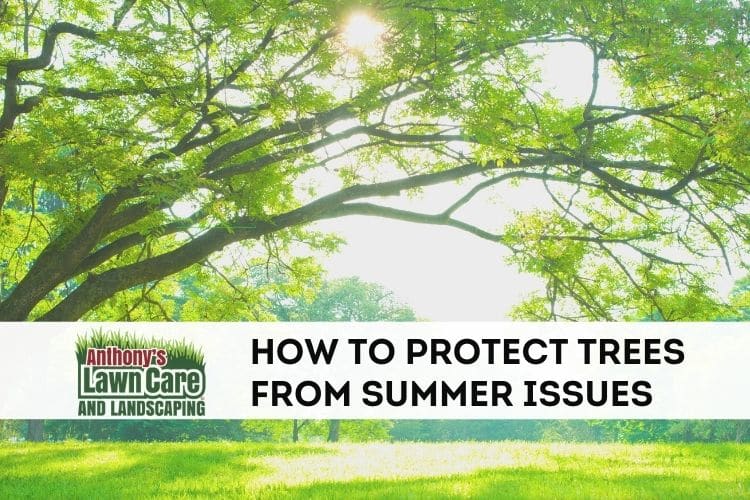If you love your trees, and all the shade, fruit and beauty they provide, you need to protect them. And summer is actually the season trees are most vulnerable, with extreme heat, insects and funguses all on the march. Thankfully, a few basics can go a long way in shielding trees from the worst of the effects of summer threats.
Mulch, but do it right
After hearing warnings of what improper mulching can do to a tree, some people get scared away and don’t mulch at all. But mulching is very important — especially in the summer. A layer of mulch can protect a tree’s root system from extreme heat and maintain moisture that would otherwise be pulled out of the ground by the beating sun.
To properly mulch, cover the area under the drip line (also known as the canopy) with about two inches of mulch. The drip line is the point on the ground where if you look straight up, the branches of the tree end. You should mulch everything within this area, because that’s about how far out the root system reaches, but do not mulch against the trunk.
Mulching against the trunk, especially in a mound pattern which some call “volcano mulching,” invites multiple problems. The root system will weaken and fill that raised area rather than growing out and downward. Moisture against the trunk will also encourage rot and fungal diseases, and the mound will be a very inviting place for the kinds of insect pests that would love access to moisture and the tree itself. Instead, make a donut with your mulch by having a healthy gap between the trunk and the beginning of the mulch.
Water, but not too much
Like with mulching, when you’re watering, the battle between saving your tree from the effects of summer heat and not introducing overly moist conditions for pests is present. The key with watering your tree in the summer is being aware of the conditions so you can properly care for your tree’s needs. If it has been raining hard for a week, watering your tree may be doing more harm than good. The extra moisture could just be making fungal diseases more welcome. Also, watering in the evening can create this risk, because the water has the entire night and morning against the tree before the sun comes out to evaporate any excess.
When the conditions are very dry though, you should definitely water your tree. Extreme heat without rain can sap away many gallons of water from your tree every day, and if not addressed, you’ll likely see leaves begin to wilt and change color. So, keep an eye on the weather to know what your trees are dealing with at that moment.
To water properly, make sure to water within the drip line, the same area you mulched in. The root system is all throughout this area and will absorb this moisture. Water slowly so you don’t just create puddles but so the water can actually be absorbed by the ground. Also, don’t water the trunk. A lot of people think to “water a tree” means to hit the trunk with a hose for a while, but the roots under the trunk can only take on so much water at a time and much will be lost. Also, too much moisture against the trunk can invite funguses and insects, just like with mulch against the trunk.
Prune to keep pests away, just not in the summer
The last piece of advice is to make sure the tree’s branches are not over crowded. This can create a place for pests to nestle in compared to a more open pattern where branches are not growing together and air can move freely. But prune in the winter. Trees are not in their growing season in the winter, so they will not be as affected by pruning. Also, in the winter there aren’t as many insects and fungal diseases around that can take advantage of the tree’s weakened defenses where the branch was pruned away.
Call Anthony’s for additional help and information
Even with your best efforts, sometimes a tree will become infested with pests or will be overwhelmed by summer heat. Anthony’s is an experienced tree specialist in the Bloomington, Indiana, area and can help determine the cause of the infestation and then get to work fixing it. Call us today at (812) 345-5694 to learn more.


Recent Comments